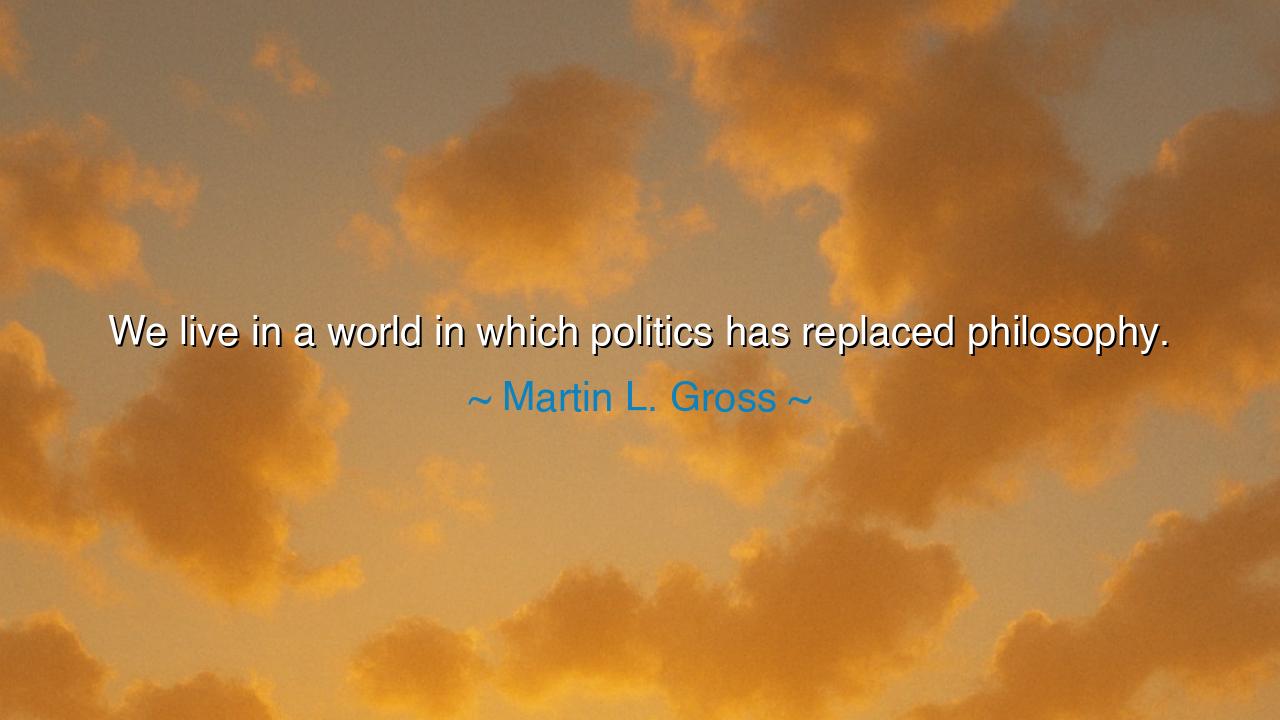
We live in a world in which politics has replaced philosophy.






The words of Martin L. Gross, spoken with sorrow and sharpness, strike like a bell tolling for lost wisdom: “We live in a world in which politics has replaced philosophy.” In this saying, he laments the fall of philosophy, once the guiding star of civilizations, now eclipsed by politics, with its hunger for power, expedience, and self-preservation. Where once men asked, What is justice? What is truth? What is the good life? they now ask only, What will win votes? What will preserve power?
The ancients knew another age. In the streets of Athens, Socrates walked barefoot, asking questions not to gain office but to awaken souls. Plato wrote of the philosopher-king, the one who rules not by desire but by wisdom, guided by truth rather than ambition. But Gross saw in our modern world a reversal: the philosopher has no throne, while the politician, devoid of wisdom, claims to rule. Thus, the compass of ideals has been discarded, and the ship of state drifts on tides of rhetoric and calculation.
Consider the fall of Rome. In the early Republic, laws were forged in debates about justice, the dignity of citizens, and the balance of power. But in the empire’s decline, politics became little more than the pursuit of survival—intrigues, assassinations, bribery, and spectacle. Philosophy was banished to private gardens, while emperors ruled with no concern for truth. Gross’s lament is an echo of that pattern: the displacement of higher thought by the brutal immediacy of politics.
His words also carry a warning. When politics replaces philosophy, the questions that shape the soul of a nation are silenced. Instead of seeking truth, leaders seek strategy; instead of wisdom, they exalt image. The people, too, are drawn into this corruption, learning not to ask what is right, but only what is advantageous. A society that abandons philosophy may gain wealth or power for a time, but it loses the very foundation of meaning and justice.
Let the generations remember: philosophy is the root from which righteous politics must grow. To sever that root is to doom the tree to wither. Gross speaks not to condemn all politics, but to call us back to the union of thought and power, where governance is guided by truth, not vanity. His words are a torch, reminding us that if politics rules without philosophy, then nations will stumble in darkness—but if wisdom once again leads, then even the mightiest empires may endure.






HVLam Hoang Viet
Martin L. Gross’ quote makes me wonder whether the prominence of politics over philosophy is truly a loss. Could the rise of political discourse simply reflect the urgent need for tangible solutions in an increasingly complex world? Or does it signal that we are no longer concerned with the big existential questions that philosophy once addressed? How can we strike a balance between the practical demands of politics and the reflective nature of philosophy?
TMLe Thi Tra My
Gross’ statement highlights the shift in focus from philosophy, which emphasizes contemplation and the search for truth, to politics, which often centers on pragmatic solutions and power dynamics. But is it possible that politics has always been intertwined with philosophy, just in a more visible way today? Does this mean that political ideology now serves as our guiding moral compass, or does it simply reflect our lack of deeper reflection and understanding in our decision-making?
BHPhan Hoang Bao Han
This quote is quite thought-provoking, especially in the context of modern society where political agendas seem to dominate public discourse. If philosophy is about questioning and understanding the deeper truths of life, does politics risk oversimplifying complex issues into polarized arguments? Have we lost the philosophical inquiry that once helped us search for meaning in the world, replacing it with political battles that often focus on power and control instead?
TNquang tri nguyen
Martin L. Gross’ quote suggests that in today’s world, politics has become the dominant force in shaping our values and guiding our decisions, overshadowing philosophy. I agree that political ideologies often dictate societal norms, but is this a bad thing? Could politics be the modern evolution of philosophy, where ideological frameworks are applied to real-world governance? Or does this shift mean that we have lost a deeper, more reflective approach to understanding life?